Everything you need to know about marketing your pub, minus the corporate nonsense
Right, let’s get one thing straight from the start. You didn’t get into the pub business to become some sort of marketing guru who speaks in buzzwords and obsesses over “engagement metrics.” You got into it because you love the atmosphere, the community, and maybe because you fancied being your own boss for once.
But here’s the thing – and I’m sure you’ve noticed – the game has changed. Your regulars are getting older, younger punters are glued to their phones, and every week there’s another chain pub opening up with their massive marketing budgets and shiny social media teams.
Meanwhile, you’re supposed to compete with them while also running the actual pub, managing staff, dealing with suppliers, and somehow finding time to eat a sandwich that isn’t yesterday’s leftover pie.
Sound familiar? Right, well, you’re not alone.
According to the British Beer & Pub Association, we’re losing about 50 pubs per month in the UK. Not because they’re rubbish pubs – often because they’re brilliant locals that just couldn’t get enough bums on seats. The pubs that are thriving? They’ve cracked the marketing code without losing their soul in the process.
This guide is going to show you exactly how to do that. No marketing degree required, no massive budget needed, and definitely no corporate speak that makes you want to throw something at the wall.
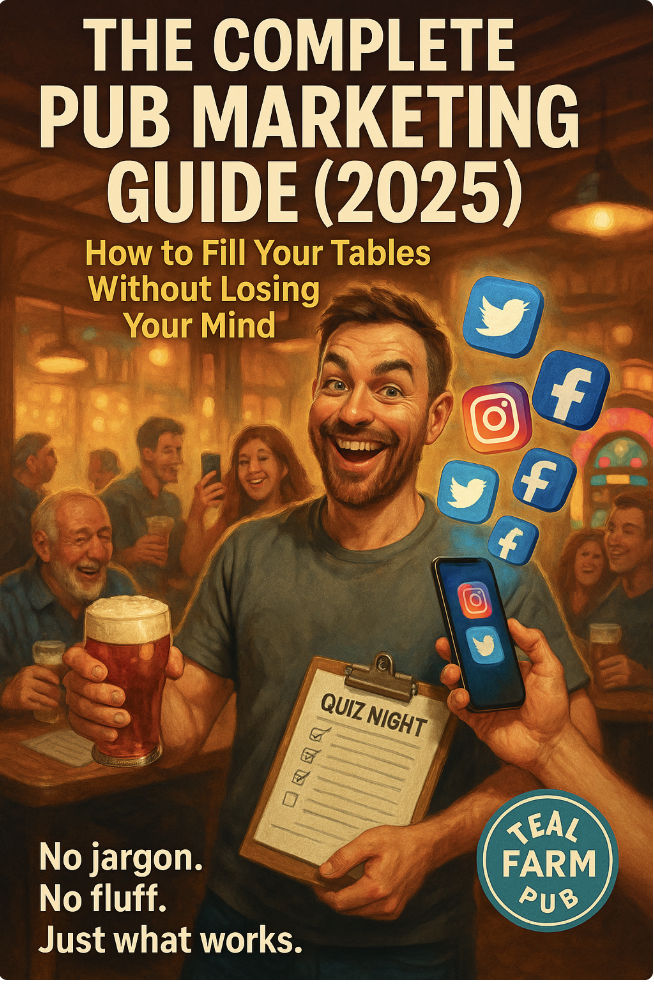
What You’ll Learn (And Why It Actually Matters)
By the time you’ve finished reading this, you’ll know how to:
- Get your pub noticed by people who’ve never walked through your door
- Turn occasional visitors into regulars who bring their mates
- Fill your quiet nights without discounting yourself into bankruptcy
- Use technology to do the heavy lifting so you can focus on running your pub
- Build a proper community around your venue (not just a customer base)
And the best bit? Most of this stuff you can set up once and let it run itself. Because you’ve got better things to do than spend every evening crafting Instagram posts.
Part 1: The Foundation – Why Most Pub Marketing Falls Flat
Let’s start with some hard truths. Most independent pub marketing is absolutely terrible. Not because pub owners are stupid – they’re usually brilliant at what they do – but because they’re trying to copy what works for coffee shops, restaurants, or retail without understanding that pubs are different beasts entirely.
The Biggest Mistakes (That Nearly Everyone Makes)
Mistake #1: Trying to Be Everything to Everyone Your pub has a personality. Maybe you’re the local where everyone knows each other’s names, or the sports pub where fans come to watch the match, or the foodie place with the chef who actually gives a toss. Whatever you are, lean into it. The worst marketing mistake is trying to appeal to absolutely everyone and ending up appealing to no one.
Mistake #2: Posting Random Content Without a Plan “Oh, it’s Tuesday, better post something on Facebook.” This approach gets you nowhere fast. Your social media should tell a story about what makes your pub special, not just remind people you exist.
Mistake #3: Competing on Price Instead of Value Every time you discount your drinks to get customers in, you’re training them to only come when things are cheap. The pubs making real money compete on atmosphere, service, and experience – not who can sell the cheapest pint.
Mistake #4: Ignoring Your Existing Customers It costs five times more to attract a new customer than to keep an existing one, according to Harvard Business Review. Yet most pubs spend all their energy trying to attract new faces while their regulars feel taken for granted.
What Actually Works (The Fundamentals That Never Change)
Before we dive into the tactics and tools, let’s get the basics right:
Know Your Pub’s Personality Are you the community local, the sports hub, the music venue, the food destination, or the after-work hangout? You can’t market effectively if you don’t know what you’re marketing. Write down three words that describe your pub’s personality, and every piece of marketing should reflect those words.
Understand Your Customers (The Real Ones, Not the Ones You Wish You Had) Stop trying to attract 22-year-old influencers if your actual customers are 35-55 year old locals who appreciate good beer and decent conversation. Market to the people who actually spend money in your pub, not the people you think look good in your Instagram photos.
Focus on the Experience, Not Just the Product Nobody chooses a pub based solely on whether you serve Stella or Carling. They choose based on how they feel when they’re there. Your marketing should sell that feeling, not just your drinks menu.
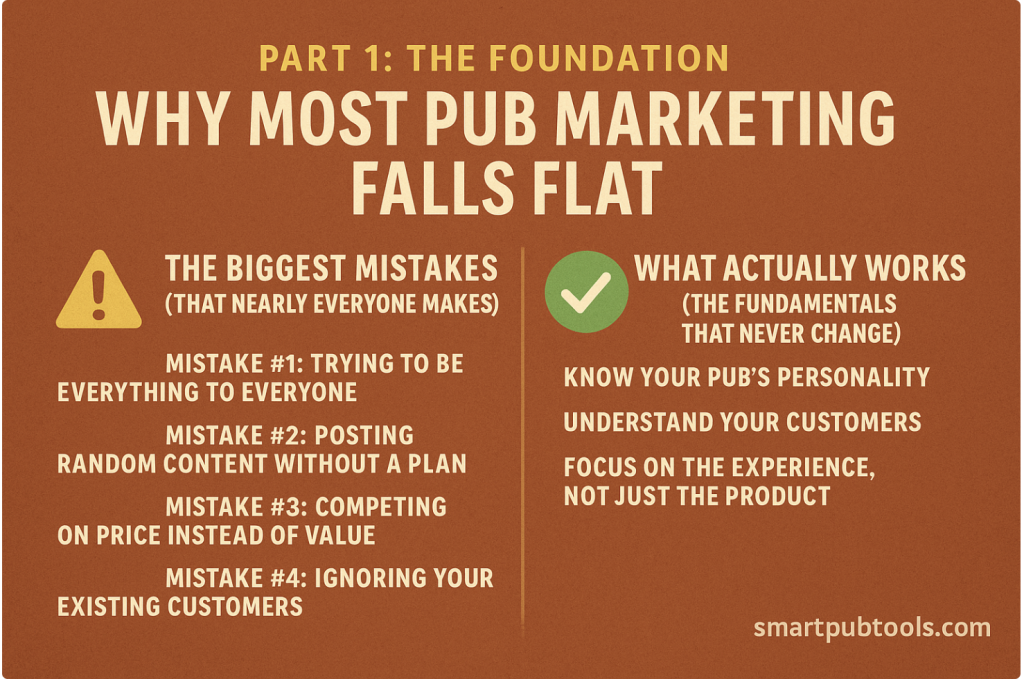
Part 2: Social Media Marketing That Actually Works
Right, let’s tackle the elephant in the room. Social media for pubs isn’t about becoming the next viral sensation or getting a million followers. It’s about staying visible to your local community and giving people a reason to think of your pub when they’re deciding where to go.
Platform Breakdown (Where to Focus Your Energy)
Facebook: Your Digital Local Facebook is where your actual customers spend time, especially if they’re over 30. Statista reports that 77% of UK adults aged 35-54 use Facebook regularly. This is your bread and butter platform.
What works on Facebook:
- Event announcements (quiz nights, live music, match screenings)
- Behind-the-scenes content (new staff, menu updates, pub improvements)
- Community posts (celebrating local events, supporting local causes)
- Customer photos and testimonials
- Live videos during events
Instagram: Show, Don’t Tell Instagram is visual storytelling. Use it to show the atmosphere, the food, the people having a good time. Think of it as your pub’s photo album that potential customers can browse.
Instagram winners:
- Food and drink photography (but make it look real, not like a magazine shoot)
- Stories showing your day-to-day pub life
- Reels capturing the energy during events
- User-generated content from customers
TikTok: The Wild Card If your customer base skews younger or you’re in a university town, TikTok can be gold. But don’t force it if it doesn’t fit your pub’s personality. A 60-year-old pub trying to go viral on TikTok usually just looks desperate.
The Content Calendar That Runs Itself
Instead of scrambling for content ideas every day, plan your month like this:
Mondays: Motivation/Week Ahead (upcoming events, specials) Tuesdays: Team Spotlight (staff features, behind-the-scenes) Wednesdays: Customer Features (regulars, group celebrations) Thursdays: Food/Drink Focus (menu highlights, new arrivals) Fridays: Weekend Preview (what’s happening, why people should come) Saturdays: Live Event Coverage (real-time posts during busy periods) Sundays: Community/Reflection (local news, thank you posts)
Content Ideas That Never Get Old
- Staff Picks: “Dave recommends the fish and chips because he’s had them every Friday for three years”
- Regular Spotlights: “Meet Margaret, who’s been coming for Sunday lunch since 1987”
- Behind the Bar: Quick videos of cocktail making or beer pouring
- Event Recaps: Photos from quiz night, live music, or sports viewing
- Local Connection: Supporting local teams, events, or causes
- Seasonal Content: Adapting your offerings to holidays and seasons
Need help creating all this content without spending your life on it? Smart Pub Tools generates social media posts, captions, and content ideas based on your pub’s personality and what’s happening locally. It’s like having a marketing team that actually understands pubs.
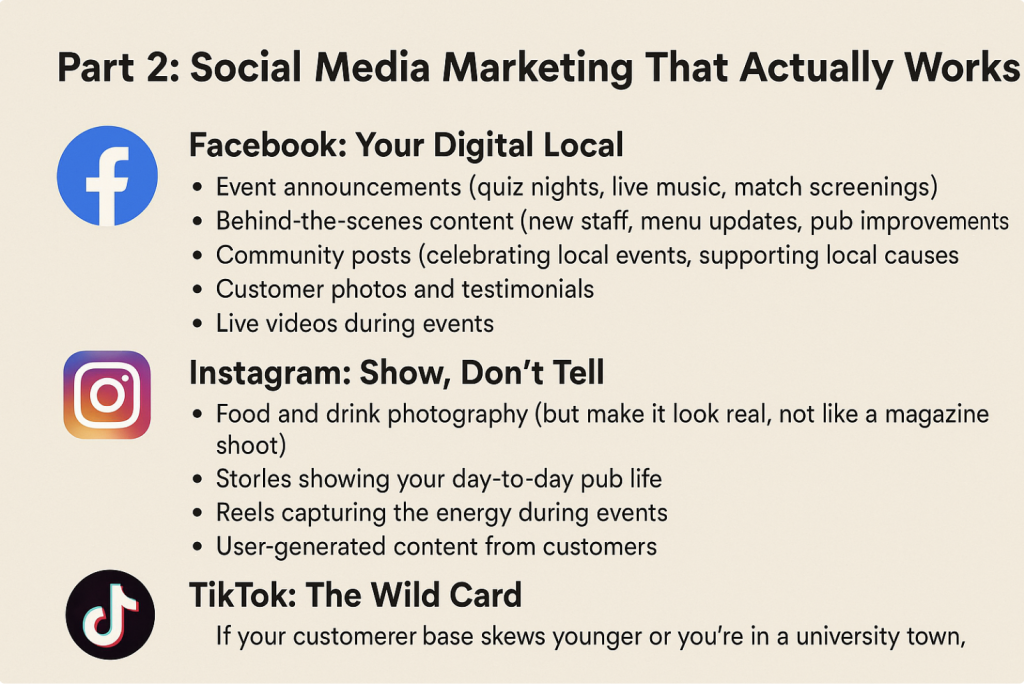
Part 3: Local Marketing – Becoming Part of the Community
Here’s where independent pubs have a massive advantage over chains: you can actually be part of your local community instead of just extracting money from it. But you’ve got to be strategic about it.
Community Partnerships That Actually Pay Off
Local Sports Teams Sponsor the local football team’s shirts, host their after-match drinks, or show their away games. Sports fans are loyal customers who come regularly and bring mates.
Schools and Charities Host fundraising events, donate prizes for school raffles, or let local groups use your function room for meetings. This builds genuine goodwill and turns you into “the pub that supports the community.”
Local Businesses Partner with the local brewery for tap takeovers, work with nearby restaurants for special events, or create packages with local bed & breakfasts. Cross-promotion works when everyone benefits.
Events Calendar Strategy
Don’t just hope people will come to your events – build anticipation and make them unmissable.
Monthly Anchor Events Pick one big event per month that becomes known as “your thing” – quiz night, live music, curry night, or whatever fits your pub. Market it heavily and make it so good that people plan their month around it.
Weekly Regulars Establish weekly events that give people a reason to visit consistently: Tuesday trivia, Thursday curry club, Friday live music, Sunday roast with live jazz.
Seasonal Specials Plan special events around holidays, sports seasons, or local festivals. Christmas parties, World Cup screenings, harvest festivals – whatever fits your community.
The Local SEO Game
When someone Googles “pub near me” or “best pubs in [your area],” you want to be the first result. Here’s how to make that happen:
Google My Business Optimization
- Keep your information updated (hours, phone, website)
- Post regularly about events and specials
- Respond to all reviews (good and bad)
- Add photos of your pub, food, and events
- Use local keywords in your descriptions
Local Directory Listings Get listed on:
- Yelp and TripAdvisor
- Local council websites
- Tourism board sites
- Local newspaper event listings
- Community Facebook groups
Review Management According to BrightLocal, 87% of consumers read online reviews before visiting a local business. One bad review can cost you dozens of customers, but a strategy for getting good reviews can fill your pub.
How to get more positive reviews:
- Ask happy customers directly (especially after good experiences)
- Train staff to mention reviews during exceptional service
- Follow up with email after events or celebrations
- Make it easy by providing direct links to review platforms
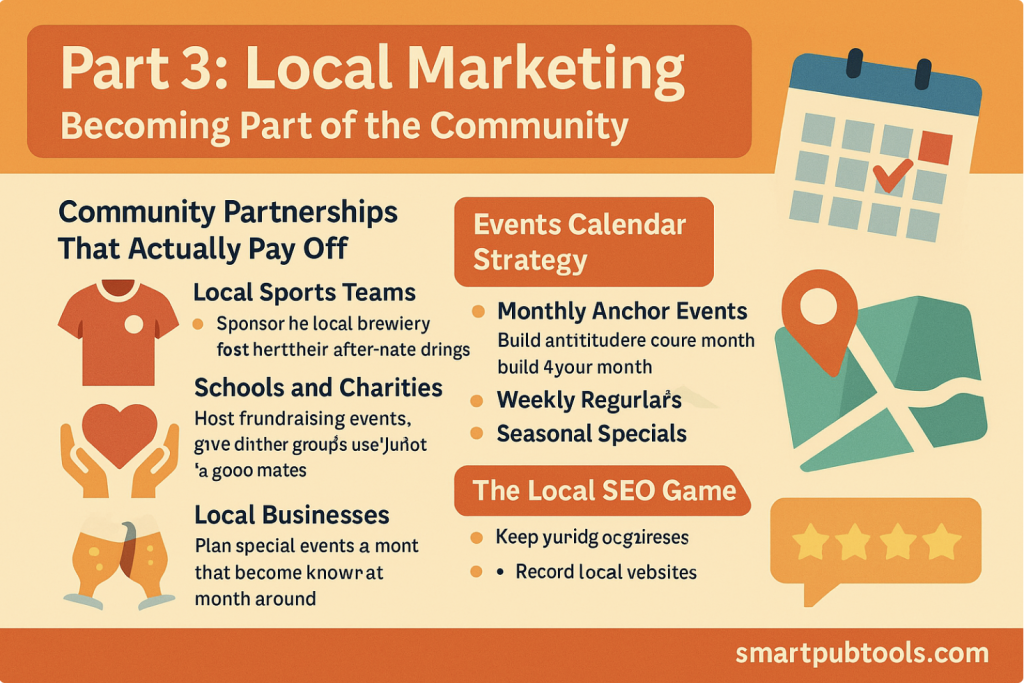
Part 4: Event Marketing That Fills Tables
Events are the lifeblood of most successful pubs, but too many publicans treat them like afterthoughts. Oh, it’s quiz night tonight, better mention it on Facebook.” That’s not event marketing – that’s hoping for the best.
The Event Marketing Timeline
4 Weeks Before: The Announcement
- Social media posts with all the details
- Update your website and Google listings
- Email your customer list if you have one
- Put up posters in the pub and around town
2 Weeks Before: Build Excitement
- Behind-the-scenes content (setting up, preparing)
- Countdown posts (“Two weeks until our biggest quiz of the year!”)
- Share what makes this event special
- Encourage early bookings or team formation
1 Week Before: Final Push
- Reminder posts with urgency (“Last chance to book!”)
- Share user-generated content from previous events
- Highlight prizes, food specials, or unique elements
- Post in local community groups
Day Of: Live Coverage
- Stories and posts throughout the event
- Encourage customers to share their own photos
- Live updates if appropriate (quiz scores, music setlists)
- Capture the atmosphere for future marketing
Day After: Recap and Thank You
- Thank everyone who attended
- Share highlights and photos
- Announce winners or special moments
- Tease the next event
Event Ideas That Actually Work
Quiz Nights (The Reliable Revenue Generator) Quiz nights are pub marketing gold because they:
- Bring groups who spend on food and drinks
- Create regular weekly customers
- Generate social media content naturally
- Cost almost nothing to run
Make your quiz night special:
- Themed rounds that tie to current events
- Prizes that bring people back (meal vouchers, event tickets)
- Interactive elements (music rounds, picture rounds)
- Team photo opportunities for social sharing
Smart Pub Tools can generate quiz questions, rounds, and even promotional content for your quiz nights – saving you hours of preparation while keeping the content fresh and engaging.
Live Music Events
- Partner with local musicians for regular slots
- Create intimate acoustic nights or full band performances
- Promote the artists on social media to tap into their fanbase
- Record short clips for future marketing content
Sports Viewing Parties
- Major tournaments and local team matches
- Create atmosphere with decorations and special menus
- Encourage team colors and fan gear
- Use hashtags and location tags for discoverability
Seasonal Celebrations
- Halloween costume contests
- Christmas party bookings
- New Year’s Eve celebrations
- Summer garden parties
- Harvest festivals
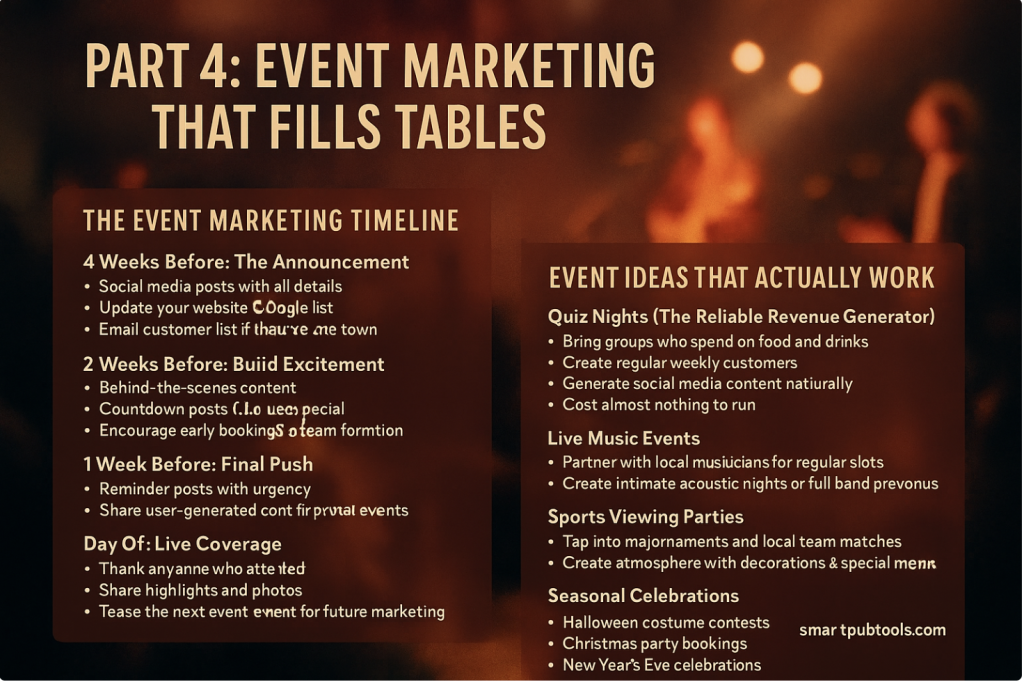
Part 5: Customer Retention – Turning Visitors Into Regulars
Getting new customers through the door is only half the battle. The real money is in turning them into regulars who come back week after week and bring their friends.
The Psychology of Pub Loyalty
People become regulars when they feel like they belong somewhere. It’s not just about the beer or the food – it’s about feeling recognized, valued, and part of something bigger than just a commercial transaction.
Recognition and Personal Service
- Train staff to remember names and usual orders
- Acknowledge birthdays and special occasions
- Create VIP experiences for your best customers
- Make people feel missed when they haven’t been in
Community Building
- Introduce customers to each other
- Create opportunities for social interaction (group tables, communal events)
- Celebrate customer achievements and milestones
- Foster friendly competition (quiz teams, darts leagues)
Loyalty Programs That Actually Work
Forget complicated point systems that require an app and a PhD to understand. Pub loyalty should be simple and immediate.
Punch Cards and Stamps “Buy 9 meals, get the 10th free” still works because it’s simple and visual.
VIP Nights Monthly events exclusively for regular customers – special tastings, early access to events, or discounted prices.
Birthday and Anniversary Perks Free drinks, special desserts, or priority booking for celebrations.
Email Marketing for Pubs
Email might seem old-fashioned, but it’s still one of the highest ROI marketing channels. For pubs, it’s perfect for:
- Event announcements and early booking
- Special offers for quiet periods
- Birthday and anniversary messages
- Seasonal menu updates
Keep it simple:
- Monthly newsletter with upcoming events
- Special offers for subscribers only
- Personal messages for celebrations
- Local news and community updates
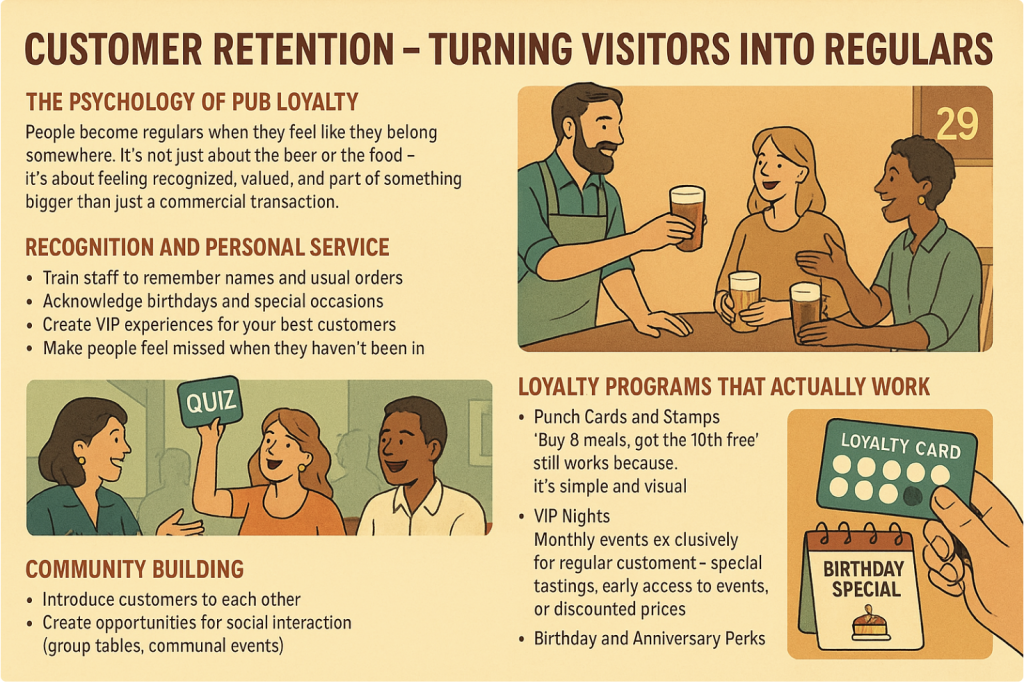
Part 6: Digital Tools and Technology
You don’t need to become a tech expert, but the right tools can automate the boring parts of marketing so you can focus on what you do best – running a great pub.
Essential Digital Tools
Social Media Management Instead of logging into five different platforms every day, use tools that let you schedule posts across all your social media from one place. Hootsuite and Buffer are popular choices, but they’re designed for generic businesses, not pubs.
Content Creation This is where most pub owners get stuck. You know you need to post regularly, but coming up with ideas and writing posts takes time you don’t have. Smart Pub Tools solves this by generating social media content, quiz questions, event descriptions, and promotional materials specifically for pubs. It understands pub culture, local trends, and what actually works for hospitality businesses.
Review Management Tools like Podium help you monitor and respond to reviews across all platforms from one dashboard. Quick responses to negative reviews can often turn unhappy customers into loyal advocates.
Booking and Events OpenTable, Resy, or even Facebook Events can help manage bookings and event attendance. The key is making it easy for customers to book and easy for you to manage.
Website Essentials
Your website doesn’t need to be fancy, but it needs to answer the basic questions every potential customer has:
- Where are you and how do they get there?
- What are your opening hours?
- What’s your food and drink like?
- What events do you host?
- How can they contact or book?
Must-Have Website Pages:
- Homepage with your key information and personality
- About page with your story and what makes you special
- Events calendar with upcoming happenings
- Menu (food and drinks) with prices
- Contact information and location map
- Gallery showing your pub’s atmosphere
The Technology Stack That Actually Works
Don’t try to use every tool available. Pick a few that work well together:
- Content Creation: Smart Pub Tools for posts, quizzes, and promotional content
- Social Media: Facebook Creator Studio (free) or Hootsuite for scheduling
- Email: Mailchimp for newsletters and event announcements
- Reviews: Google My Business app for monitoring and responding
- Website: WordPress with a simple, mobile-friendly theme
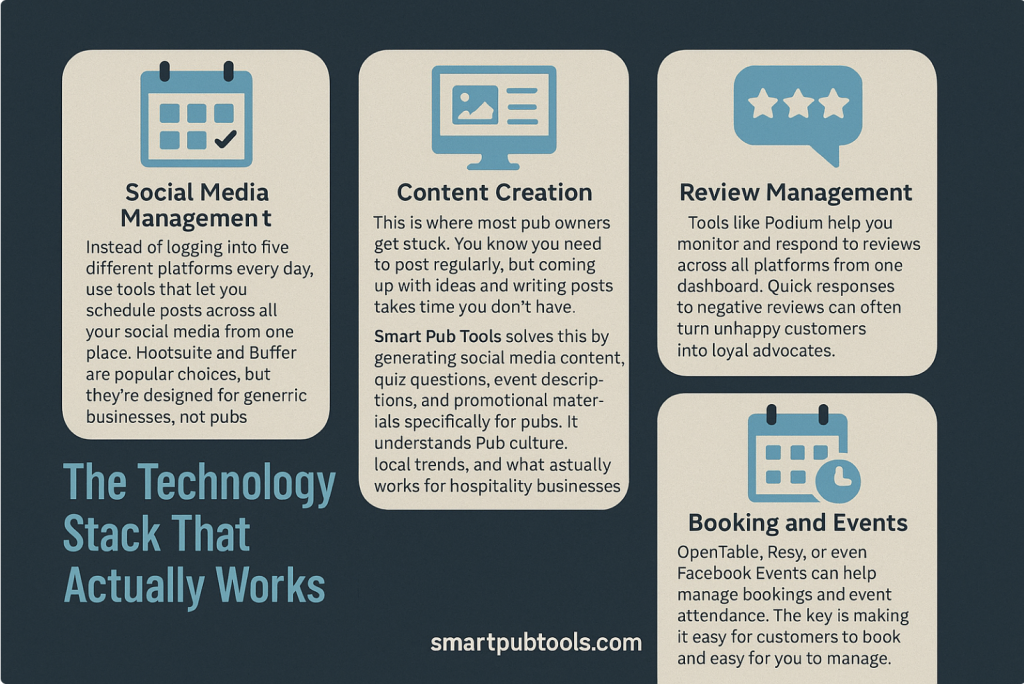
Part 7: Measuring Success (Without Becoming a Data Nerd)
You need to know what’s working and what isn’t, but you don’t need to become obsessed with analytics. Focus on the metrics that actually matter for pub business.
Key Metrics to Track
Footfall and Revenue
- Weekly and monthly visitor numbers
- Average spend per customer
- Revenue per event or special promotion
- Busiest days and quietest periods
Social Media (The Basics)
- Followers who actually live nearby (not total followers)
- Engagement on event posts vs. general content
- Click-throughs to your website or booking page
- Customer-generated content and shares
Customer Retention
- How often regulars visit
- New vs. returning customer ratio
- Customer lifetime value
- Referral rate (customers bringing friends)
Event Success
- Attendance numbers and revenue per event
- Cost per event vs. profit generated
- Social media engagement during events
- Booking conversion rate (inquiries to actual attendance)
Simple Tracking Methods
You don’t need expensive analytics software. Start with:
- Weekly till reports to track revenue trends
- Simple spreadsheet for event attendance
- Free Google Analytics for website traffic
- Native analytics on social media platforms
- Staff feedback on customer conversations
What Good Looks Like
- Social Media: Regular engagement from local people, not just likes from random accounts
- Events: Consistent attendance that grows over time, not massive spikes followed by empty rooms
- Revenue: Steady growth in average spend per customer, not just more customers spending less
- Community: Customers talking to each other, not just to staff
- Referrals: New customers mentioning they heard about you from friends
Part 8: Seasonal Marketing and Special Occasions
Pubs have natural rhythms – busy Friday nights, quiet Tuesday afternoons, packed weekends during football season, dead periods in January. Smart marketing works with these rhythms instead of fighting them.
Maximizing Peak Periods
Weekend Strategies Don’t just hope weekends will be busy – make them unmissable:
- Create weekly traditions (Friday night music, Saturday sport, Sunday roast)
- Build anticipation throughout the week on social media
- Offer group booking incentives
- Partner with local taxi companies for safe travel home
Holiday Marketing Plan your holiday campaigns months in advance:
- Christmas: Party bookings, gift vouchers, special menus
- New Year: Ticket events, group packages, taxi partnerships
- Valentine’s Day: Couples packages, intimate dining options
- Easter: Family events, garden openings, special roasts
- Summer: Beer gardens, BBQs, outdoor events
Surviving Quiet Periods
January Blues After Christmas excess, people want value and comfort:
- Hearty, affordable comfort food
- “New Year, New Local” campaigns for resolution-makers
- Cozy atmosphere marketing (fires, blankets, warm lighting)
- Dry January alternatives (mocktails, coffee events)
Weeknight Activation Turn dead Monday-Wednesday into revenue opportunities:
- Monday industry nights (hospitality workers’ hangout)
- Tuesday trivia or quiz leagues
- Wednesday wine tastings or curry nights
- Thursday “tomorrow’s Friday” celebrations
Local Event Calendar Integration
Become the unofficial headquarters for local events:
- Pre and post-match drinks for local sports
- Before and after venue for theater, concerts, or festivals
- Celebration spot for local school events, graduations
- Meeting point for walking groups, book clubs, hobby societies
Part 9: Crisis Management and Reputation Protection
Every pub will face challenges – bad reviews, staff issues, difficult customers, or external crises. How you handle these situations can make or break your reputation.
Bad Review Response Strategy
The Golden Rules:
- Respond quickly (within 24 hours)
- Never get defensive or argue
- Take responsibility where appropriate
- Offer to resolve issues offline
- Show you care about customer experience
Example Response Template: “Thanks for taking the time to share your feedback, [Name]. I’m sorry your experience didn’t meet expectations. We’ve addressed the issues you mentioned with our team and would love the chance to welcome you back for a better experience. Please message us directly so we can make this right.”
Staff Training for Customer Service
Your staff are your brand ambassadors. Train them to:
- Handle complaints professionally and sympathetically
- Know when to escalate issues to management
- Encourage happy customers to share their experience online
- Represent your pub’s personality consistently
Social Media Crisis Management
Common Scenarios and Responses:
- Food poisoning claims: Take seriously, investigate immediately, respond professionally
- Staff behavior complaints: Acknowledge, investigate privately, follow up publicly
- Pricing complaints: Explain value proposition, don’t get into price wars
- Service issues: Apologize genuinely, explain steps being taken
Building Reputation Resilience
The best defense against negative feedback is consistently positive experiences:
- Regular staff training and team meetings
- Customer feedback systems (suggestion boxes, informal conversations)
- Proactive quality control (food, service, cleanliness)
- Strong relationships with regular customers who’ll defend you
Part 10: Advanced Strategies and Future-Proofing
Once you’ve mastered the basics, here are advanced tactics to stay ahead of the competition and future-proof your pub business.
Influencer Marketing for Pubs
Forget celebrity influencers – focus on local micro-influencers who actually influence your target customers:
- Local food bloggers and Instagram accounts
- Community group leaders and local celebrities
- Regular customers with strong social media presence
- Local business owners and professionals
Partnership Marketing
Cross-Promotion Opportunities:
- Local breweries for tap takeovers and special events
- Nearby restaurants for food and drink pairings
- Local hotels and B&Bs for tourist packages
- Event venues for pre and post-event drinks
- Corporate partnerships for team building and networking events
Technology Integration
QR Code Menus and Ordering Lessons from COVID showed that contactless solutions can improve efficiency:
- Digital menus that update in real-time
- Table ordering systems for faster service
- Loyalty program integration
- Social media integration for easy sharing
Data-Driven Decision Making Use customer data to improve your offerings:
- Track popular menu items and seasonal preferences
- Analyze busy periods to optimize staffing
- Identify your most valuable customers for VIP treatment
- Test different marketing messages to see what resonates
Sustainability Marketing
Environmental consciousness is increasingly important to customers:
- Local sourcing and seasonal menus
- Waste reduction initiatives
- Energy efficiency improvements
- Community environmental projects
Market these efforts authentically – customers can spot greenwashing from miles away.
The Tools That Make It All Possible
Running a successful pub while managing all this marketing might seem overwhelming, but the right tools can automate most of the heavy lifting.
Why Smart Pub Tools Is Different
Most marketing tools are designed for generic businesses. They don’t understand that pub customers behave differently than retail customers, or that pub marketing needs to feel authentic and community-focused.
Smart Pub Tools was built specifically for pub owners who want professional marketing without losing their personality. It generates:
- Social media content that sounds like it came from your pub, not a corporate marketing department
- Quiz questions and event content that keeps your events fresh and engaging
- Email campaigns that build community rather than just pushing sales
- Promotional materials that reflect your pub’s unique character
- Review responses that handle criticism professionally while protecting your reputation
The Complete Marketing Automation Setup
Here’s how to put everything on autopilot:
- Content Calendar: Plan your monthly themes and events
- Automated Social Posts: Schedule regular content that promotes your personality and events
- Email Sequences: Welcome new customers, announce events, celebrate milestones
- Review Monitoring: Get alerts for new reviews and respond quickly
- Performance Tracking: Monthly reports on what’s working and what needs adjustment
Getting Started Without Overwhelm
Don’t try to implement everything at once. Start with:
Week 1: Set up your Google My Business properly and start collecting customer emails Week 2: Plan your content calendar for the next month Week 3: Set up Smart Pub Tools and create your first automated social media posts Week 4: Launch your first properly marketed event using everything you’ve learned
Your Next Steps: From Reading to Results
Right, you’ve made it through 4,000 words of pub marketing advice. The question now is: what are you actually going to do with it?
The 30-Day Pub Marketing Kickstart
Days 1-7: Foundation
- Update your Google My Business with current info and great photos
- Set up basic social media profiles if you haven’t already
- Start collecting customer email addresses (simple signup sheet works fine)
- Take photos of your pub, food, and atmosphere for future use
Days 8-14: Content Creation
- Plan your content calendar for the next month
- Create your first week of social media posts
- Write email welcome sequence for new subscribers
- Set up Smart Pub Tools to automate content creation
Days 15-21: Community Building
- Reach out to local businesses for partnership opportunities
- Plan your next month’s events and start promoting them
- Respond to all existing online reviews
- Start engaging with local community groups on social media
Days 22-30: Optimization and Growth
- Analyze what content gets the best engagement
- Refine your posting schedule based on when your audience is active
- Plan your first major promotional campaign
- Set up systems to track what’s working
The Reality Check
Marketing your pub effectively isn’t about becoming a social media guru or spending hours crafting perfect posts. It’s about consistently showing your community what makes your pub special and giving them reasons to choose you over the competition.
The pubs that succeed long-term are the ones that:
- Know their personality and stick to it
- Stay connected to their local community
- Make customers feel valued and recognized
- Use technology to handle the boring bits
- Focus on experiences, not just products
Your Marketing Success Metrics
In six months, you should see:
- More faces you don’t recognize (but who feel welcome)
- Regulars bringing friends and family
- Events that people ask about in advance
- Social media followers who actually live nearby and engage with your content
- Positive reviews that mention specific things about your pub’s personality
- Revenue growth that comes from customers spending more, not just more customers
The Investment That Pays for Itself
Good pub marketing isn’t an expense – it’s an investment that pays for itself through:
- Higher average spend per customer
- More frequent visits from regulars
- Reduced reliance on discounting to bring in customers
- Events that generate significant additional revenue
- Word-of-mouth referrals that cost nothing but bring high-value customers
Ready to Stop Guessing and Start Growing?
You now know more about pub marketing than 90% of your competition. The difference between this knowledge and actual results is implementation.
Smart Pub Tools can handle the time-consuming parts – content creation, social media scheduling, event promotion, and customer communication – so you can focus on what you do best: running a brilliant pub.
Try it free for 7 days and see how much easier pub marketing becomes when you have tools that actually understand your business.
No credit card required, no long-term commitment, and definitely no corporate nonsense. Just marketing tools that work for real pubs run by real people.
Right, now stop reading about marketing and get back to what you do best – running a pub that people actually want to visit. The marketing can run itself if you set it up properly.